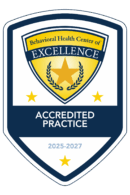Communication skills. Not being able to communicate with loved ones can lead to challenging situations. Communication can come in the form of verbal language, sign language, picture exchange communication systems (PECs), or augmentative and alternative communication (AAC) devices. Learning to communicate encourages independence while reducing problematic behavior. Learning to make requests will expand vocabulary and improve social awareness and conversations. At BehaviorWorks, our therapists work with clients to replace problem behavior with verbal communication. Developing a client’s ability to express their wants and needs opens the door to endless possibilities. Whether an individual communicates by pushing, grunting, pointing, or speaking, our therapists are ready to meet them where they’re at and work towards the next milestone.
Adaptive daily life & self-help skills. Through behavior therapy, these skills can be broken down into smaller steps and taught individually (task analysis). Examples of ADL and self-help skills include but are not limited to dressing, grooming, eating, toilet training, personal hygiene, and household chores.
Problem behavior reduction. A significant aspect of behavior therapy is addressing problem behaviors by identifying the underlying causes and implementing strategies to reduce or replace those behaviors with more appropriate alternatives. Functional behavior assessments are conducted to understand the function or purpose of problem behaviors, and then behavior intervention plans are developed to target the behavior and reinforce desirable alternatives.
Executive skills. Behavior therapy can improve administrative functioning skills such as organization, time management, planning, problem-solving, and decision-making. It involves using visual supports, schedules, and prompts to help individuals develop and practice these skills in real-life situations.
Social skills. Behavior therapy often teaches social skills, including turn-taking, initiating and maintaining conversations, engaging in eye contact, sharing, empathy, and understanding emotions and social cues. Modeling, role-playing, and reinforcement techniques teach and reinforce appropriate social behaviors.
Gross & fine motor skills. Behavior therapy can strengthen gross motor skills (e.g., running, jumping, throwing) and fine motor skills (e.g., handwriting, feeding with utensils, using buttons, zippers, and snaps). Task analysis, prompting, and reinforcement are used to break down these skills into smaller steps and strengthen these skills.



Leave A Comment
You must be logged in to post a comment.